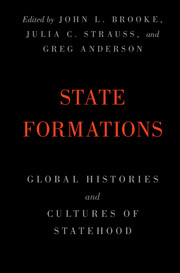Book contents
- State Formations
- State Formations
- Copyright page
- Dedication
- Contents
- Figures and Maps
- Tables
- Contributors
- Preface
- Acknowledgments
- Introduction
- Part I Definitions
- 1 On the Person of the State
- 2 The State as a Social Relation
- 3 Was There Any Such Thing as a Nonmodern State?
- Part II Foundings
- Part III Agendas
- Part IV Memberships
- Conclusion
- Index
3 - Was There Any Such Thing as a Nonmodern State?
from Part I - Definitions
Published online by Cambridge University Press: 23 March 2018
- State Formations
- State Formations
- Copyright page
- Dedication
- Contents
- Figures and Maps
- Tables
- Contributors
- Preface
- Acknowledgments
- Introduction
- Part I Definitions
- 1 On the Person of the State
- 2 The State as a Social Relation
- 3 Was There Any Such Thing as a Nonmodern State?
- Part II Foundings
- Part III Agendas
- Part IV Memberships
- Conclusion
- Index
Summary
- Type
- Chapter
- Information
- State FormationsGlobal Histories and Cultures of Statehood, pp. 58 - 70Publisher: Cambridge University PressPrint publication year: 2018
- 1
- Cited by



